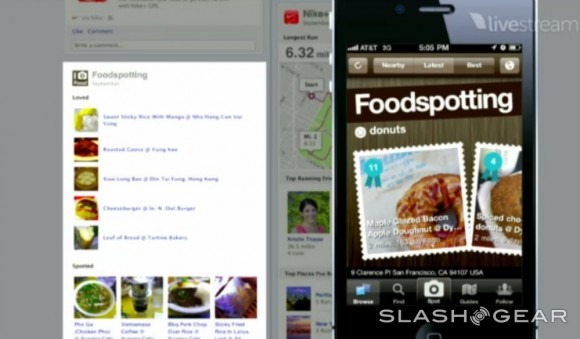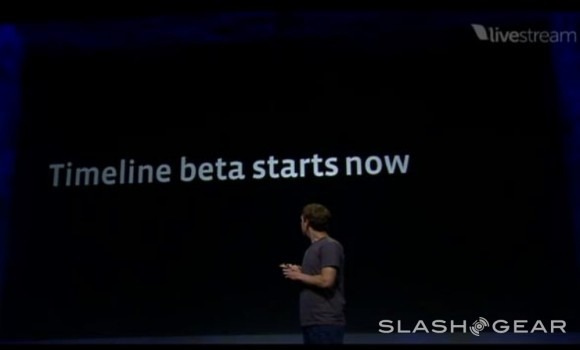f8 2011 Facebook changes Full Guide [Video]
Without a doubt, today's first and most major keynote at f8 2011 showed Facebook to be making some major changes in the very near future. Starting with a whole new layout and set of functions they're calling "Timeline" and moving through app enhancements that have the potential to change the way we use apps on all platforms, we've got a guide here for you, the Facebook user, to easily understand what you've got in store. This is Facebook as it will exist starting at the tail end of 2011.
Before we begin, I must direct your attention to the posts we've done earlier on this subject, those being written up right as the news was breaking, starting with Watch Facebook's f8 here [LIVE] – if you're still looking at this post on the 22nd of September, 2011, you'll be able to catch several more events inside the day there too. Next there's Zuckerberg reveals Timeline, a whole new Facebook at f8 2011, this post showing off basically what we'll be covering in the post you're in now, along with the Facebook Open Graph ushers in new serendipitous era for apps, all in an easy to understand, easy to read outline.
Timeline
At the center of everything you're going to read today is this: Timeline. It's a new way for Facebook to organize itself, specifically here on a users Profile. What's interesting here is that no real announcements have been made thus far about changes to your news feed, so it's very possible that the iteration we've got right this minute will be what we've got in the foreseeable future. What Timeline does is organize your entire history on Facebook into one ultra-fast scrollable page. From what we've seen Zuckerberg demonstrate on stage, the way Timeline is setup makes it able to be scrolled through in no time at all. Whether or not that will translate to real-life usage we're not sure quite yet.
Timeline separates events, updates, albums, and everything you've done, essentially, into boxes that you can expand. As you travel down the timeline (with the top being today and the bottom being your birth), you can see these events get smaller and smaller. This is so that recent events, which are more likely to be read in the present, are ready to go, while the more rarely read past posts can be expanded only when needed. This cuts down on loading time immensely, as you can imagine.
Your statuses go here, your newly added photos go here, photos other people have tagged you in go here, and apps go here – not in the same way they have before though, you've got to add them yourself with a swift new process I'll get to in a moment. You have some degree of control over what's seen, not seen at all, and emphasized in your Timeline, this creating a situation that's much closer to modern blogs than it is to the original Facebook. Your profile page has become a destination again, much like it was when Facebook first began.
B-Roll Video
Google has released a B-Roll video walkthrough of the whole shebang, available here, fully optimized with music from Zuckerberg's favorite band: Green Day.
[vms e712e50c580c032d99b6]
Apps
You've got yourself a cool little bin of apps, social games that you can play with your friends or on your own, all the games you know and love on Facebook so far plus billions more on their way. What's different about this is your ability to do away with "would you like to post this" sorts of notifications you occasionally see inside apps and the one-time "yes, I would" request upon installing new applications. As several presenters expressed during the speech, it is the assumption that you want to share an apps contents that fuels this, your downloading of the app signifies your desire to share it.
There is a new class of application on Facebook now called Open Graph. This class is defined by three principles: Frictionless experiences, Realtime serendipity, and Finding patterns. The goal here is to have subject matter (games, music, video, social apps) spread to friends via friends in as enjoyable a manner as possible. While this has been happening somewhat in the fact that sharing anything on Facebook signifies your want to have friends immerse themselves in the content you're sending, Open Graph allows for much more interactive ways of doing this.
Social games have been able to be played together for some time now, so that's not exactly new – what is new is the ability to enjoy a lovely piece of music or a cool new video together on separate ends of a connection. If you've got a friend who is watching a movie you'd be interested in on Hulu and they share it with the Hulu app, you will be able to watch that movie as well inside the Facebook page you opened it in.
The same goes for music – nice song you just listened to there with Spotify, think I'll listen to it now too! Often these sharing experiences open up into what's called a Canvass app, one that sits aside from what you know today as your normal Facebook layout to provide you with a new way to experience the media you'd like to work with or enjoy.
Partners
The following tiny gallery contains one whole heck of a lot of partners joining up with Facebook to get all of these functions working right out of the gate. You'll find partners in video, music, gaming, and news publishing. Netflix, by the way, is coming as well, the CEO of Netflix came on stage to note that they're currently banned from such functionality because of a law that only exists in the USA, but that a bill was in congress right that minute looking to ratify this so the video streaming giant could join the party asap.
Social Apps
What's known as Social Apps are those that you can open inside your Facebook page that can also work with functionality outside your web connection. One example is a jogging app which, when you activate it on your mobile phone inside your web browser with Facebook, you can enter in GPS details automatically. This could mean big things for app developers looking to create apps that are entirely cross-platform. Another example is a food app called Foodspotting which does not run inside Facebook, but does report back information to Facebook for you to look at later, like photos of food and how good the food tasted and what kind of food it was, and so forth.

When will I see all of this change?
The best answer I can give you right this second is – soon. The beta program for Timeline has been released via their Introducing Timeline page – hit the Sign Me Up button to get in on it early. Everything else should be rolling out, as I often say, immediately if not soon.

